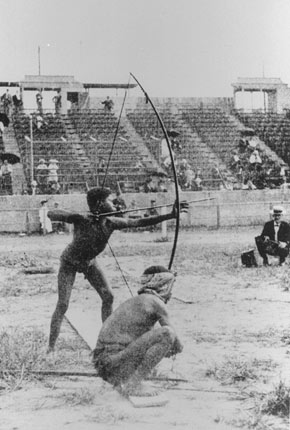We know that American swimmer Michael Phelps won 6 medals in London in 2012, giving him a total of 22 Olympic medals. We also know that this broke the record for the most Olympic medals all-time, breaking the record of 18 that had been held since 1964 by Soviet gymnast Larysa Latynina. Who held the record before Latynina? In baseball, track & field, and several other sports, the list of record progressions is well studied. Is there such a list of the progression of most Olympic medals? Well, we’ve never seen one before but we decided to provide these lists for you, in various permutations.
Here is the overall list for most Olympic medals won. Note that everyone on the list was male except Latynina, so we have also provided the male progression by adding in Nikolay Andrianov.
[table]
Medals,Name,Gdr,Ssn,NOC,Sport,Year
6,Hermann Weingärtner,M,S,GER,GYM,1896
6,Bob Garrett,M,S,USA,ATH,1900
6,Anton Heida,M,S,USA,GYM,1904
6,George Eyser,M,S,USA,GYM,1904
6,Burton Downing,M,S,USA,CYC,1904
6,Ray Ewry,M,S,USA,ATH,1904
7,Léon Moreaux,M,S,FRA,SHO,1906
8,Ray Ewry,M,S,USA,ATH,1906
10,Ray Ewry,M,S,USA,ATH,1908
8,Ray Ewry,M,S,USA,ATH,1908
10,Hubert Van Innis,M,S,BEL,ARC,1920
11,Carl Osburn,M,S,USA,SHO,1924
12,Paavo Nurmi,M,S,FIN,ATH,1928
13,Edoardo Mangiarotti,M,S,ITA,FEN,1960
18,Larysa Latynina,F,S,URS,GYM,1964
15,Nikolay Andrianov,M,S,URS,GYM,1980
22,Michael Phelps,M,S,USA,SWI,2012
[/table]
Two marks for men on this list lasted for 32 years – Paavo Nurmi’s 12 medals, which stood from 1928-60, and Nikolay Andrianov’s 15 medal mark for men, which stood from 1980-2012. Of course, Latynina’s mark lasted for 48 years until Phelps broke it in 2012.
Here is the list for women only, all at the Summer Olympics:
[table]
Medals,Name,Gdr,Ssn,NOC,Sport,Year
2,Charlotte Cooper,F,S,GBR,TEN,1900
2,Countess Hélène de Pourtalès,F,S,SUI,SAI,1900
2,Hélène Prévost,F,S,FRA,TEN,1900
2,Marion Jones,F,S,USA,TEN,1900
2,Hedwiga Rosenbaumová,F,S,BOH,TEN,1900
3,Lida Howell,F,S,USA,ARC,1904
3,Emma Cooke,F,S,USA,ARC,1904
3,Eliza Pollock,F,S,USA,ARC,1904
3,Ethelda Bleibtrey,F,S,USA,SWI,1920
3,Suzanne Lenglen,F,S,FRA,TEN,1920
3,Frances Schroth,F,S,USA,SWI,1920
5,Kitty McKane,F,S,GBR,TEN,1924
7,Mariya Horokhovska,F,S,URS,GYM,1952
10,Ágnes Keleti,F,S,HUN,GYM,1956
12,Larysa Latynina,F,S,URS,GYM,1960
18,Larysa Latynina,F,S,URS,GYM,1964
[/table]
Latynina’s record for women, with 18 medals, will have stood for 52 years in Rio de Janeiro, and will likely stand for many more Olympiads.
Now at the Winter Games, the progression actually entails a combination of men and women:
[table]
Medals,Name,Gdr,Ssn,NOC,Sport,Year
2,Madge Syers,F,W,GBR,FSK,1908
2,Phyllis Johnson,F,W,GBR,FSK,1920
5,Clas Thunberg,M,W,FIN,SSK,1924
7,Clas Thunberg,M,W,FIN,SSK,1928
7,Ivar Ballangrud,M,W,NOR,SSK,1936
7,Veikko Hakulinen,M,W,FIN,CCS,1960
9,Sixten Jernberg,M,W,SWE,CCS,1964
9,Raisa Smetanina,F,W,URS,CCS,1988
10,Raisa Smetanina,F,W,EUN/URS,CCS,1992
12,Bjørn Dæhlie,M,W,NOR,CCS,1998
13,Ole Einar Bjørndalen,M,W,NOR,BIA,2014
[/table]
Following are the winter lists for men and women separately:
[table]
Medals,Name,Gdr,Ssn,NOC,Sport,Year
1,9 athletes tied,M,W,—,FSK,1908
1,9 athletes tied,M,W,—,FSK,1920
1,24 athletes tied,M,W,—,ICH,1920
5,Clas Thunberg,M,W,FIN,SSK,1924
5,Roald Larsen,M,W,NOR,SSK,1924
7,Clas Thunberg,M,W,FIN,SSK,1928
7,Ivar Ballangrud,M,W,NOR,SSK,1936
7,Veikko Hakulinen,M,W,FIN,CCS,1960
9,Sixten Jernberg,M,W,SWE,CCS,1964
12,Bjørn Dæhlie,M,W,NOR,CCS,1998
13,Ole Einar Bjørndalen,M,W,NOR,BIA,2014
[/table]
[table]
Medals,Name,Gdr,Ssn,NOC,Sport,Year
2,Madge Syers,F,W,GBR,FSK,1908
2,Phyllis Johnson,F,W,GBR,FSK,1920
2,Ludovika Jakobsson-Eilers,F,W,FIN,FSK,1924
3,Andrée Brunet-Joly,F,W,FRA,FSK,1932
3,Beatrix Loughran,F,W,USA,FSK,1932
3,Sonja Henie,F,W,NOR,FSK,1936
3,Trude Jochum-Beiser,F,W,AUT,ASK,1952
3,Mirl Buchner,F,W,GER,ASK,1952
4,Lyubov Kozyreva-Baranova,F,W,URS,CCS,1960
4,Radiya Yeroshina,F,W,URS,CCS,1960
6,Lidiya Skoblikova,F,W,URS,SSK,1964
7,Galina Kulakova,F,W,URS,CCS,1976
8,Galina Kulakova,F,W,URS,CCS,1980
9,Raisa Smetanina,F,W,URS,CCS,1988
10,Raisa Smetanina,F,W,EUN/URS,CCS,1992
10,Stefania Belmondo,F,W,ITA,CCS,2002
10,Marit Bjørgen,F,W,NOR,CCS,2014
[/table]
Now what about gold medals and the progression lists for them? Here is the list for men at the Summer Olympics – here again we have the problem with the 1906 Olympics so we have listed Ray Ewry, both with and without those Games:
[table]
Golds,Name,Gdr,Ssn,NOC,Sport,Year
3,Hermann Weingärtner,M,S,GER,GYM,1896
3,Alfred Flatow,M,S,GER,GYM,1896
3,Paul Masson,M,S,FRA,CYC,1896
3,Carl Schuhmann,M,S,GER,GYM/WRE,1896
3,Carl Schuhmann,M,S,GER,GYM,1896
4,Al Kraenzlein,M,S,USA,ATH,1900
6,Ray Ewry,M,S,USA,ATH,1904
8,Ray Ewry,M,S,USA,ATH,1906
10,Ray Ewry,M,S,USA,ATH,1908
8,Ray Ewry,M,S,USA,ATH,1908
9,Paavo Nurmi,M,S,FIN,ATH,1928
9,Mark Spitz,M,S,USA,SWI,1972
9,Carl Lewis,M,S,USA,ATH,1996
14,Michael Phelps,M,S,USA,SWI,2008
18,Michael Phelps,M,S,USA,SWI,2012
[/table]
One thing to note above, if one disregards the 1906 Olympics, is how long Paavo Nurmi’s record of 9 gold medals lasted, fully 44 years, until tied in 1972 by Mark Spitz.
Now the women’s Summer Olympic gold medal record progression:
[table]
Golds,Name,Gdr,Ssn,NOCGolds,SptGolds,Year
2,Charlotte Cooper,F,S,GBR,TEN,1900
3,Lida Howell,F,S,USA,ARC,1904
3,Ethelda Bleibtrey,F,S,USA,SWI,1920
3,Martha Norelius,F,S,USA,SWI,1928
3,Helene Madison,F,S,USA,SWI,1932
3,Rie Mastenbroek,F,S,NED,SWI,1936
4,Fanny Blankers-Koen,F,S,NED,ATH,1948
5,Ágnes Keleti,F,S,HUN,GYM,1956
7,Larysa Latynina,F,S,URS,GYM,1960
9,Larysa Latynina,F,S,URS,GYM,1964
[/table]
Note that Latynina still holds this record, and has held it since 1960 – which will be 56 years in Rio.
Following are the gold medal record progressions for men and women at the Winter Games:
[table]
Golds,Name,Gdr,Ssn,NOCGolds,SptGolds,Year
3,Clas Thunberg,M,W,FIN,SSK,1924
5,Clas Thunberg,M,W,FIN,SSK,1928
5,Eric Heiden,M,W,USA,SSK,1980
5,Bjørn Dæhlie,M,W,NOR,CCS,1994
8,Bjørn Dæhlie,M,W,NOR,CCS,1998
8,Ole Einar Bjørndalen,M,W,NOR,BIA,2014
[/table]
Note here how long Clas Thunberg’s 5 gold medal record lasted – from 1928 until 1980 when it was tied by Eric Heiden, and until 1998 when it was broken by Bjørn Dæhlie.
[table]
Golds,Name,Gdr,Ssn,NOCGolds,SptGolds,Year
2,Andrée Brunet-Joly,F,W,FRA,FSK,1932
3,Sonja Henie,F,W,NOR,FSK,1936
6,Lidiya Skoblikova,F,W,URS,SSK,1964
6,Lyubov Yegorova,F,W,EUN/RUS,CCS,1994
6,Marit Bjørgen,F,W,NOR,CCS,2014
[/table]
Again, two long-lasting records, with Sonja Henie leading the list from 1936-64, and Lidiya Skoblikova leading the list from 1964 through 2014, although her 6 gold medals have been tied twice.
